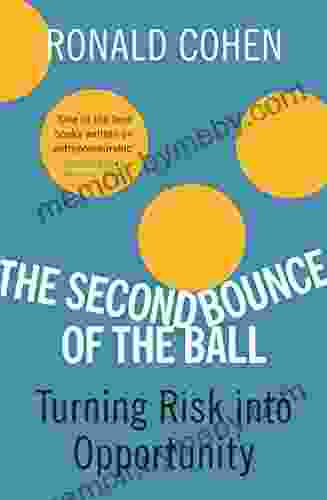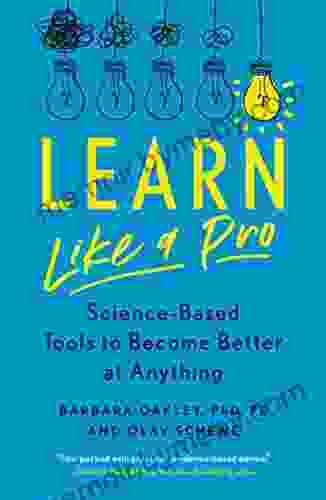Unlock Your Potential: Science-Based Tools to Become Better at Anything

In today's rapidly evolving world, the ability to learn and improve our skills has become more crucial than ever. Whether you're striving to enhance your job performance, pursue a new hobby, or simply become a more well-rounded individual, the pursuit of personal growth is an ongoing journey.
4.6 out of 5
| Language | : | English |
| File size | : | 20538 KB |
| Text-to-Speech | : | Enabled |
| Enhanced typesetting | : | Enabled |
| X-Ray | : | Enabled |
| Word Wise | : | Enabled |
| Print length | : | 147 pages |
| Screen Reader | : | Supported |
Thankfully, science has provided us with a wealth of insights and tools that can empower us to become better at anything we set our minds to. This article will explore some of these evidence-based strategies, drawing from the latest research in neuroscience, psychology, and behavioral science.
1. Deliberate Practice: The Key to Mastery
At the heart of skill acquisition lies the concept of deliberate practice. This involves engaging in focused and repetitive exercises that challenge your abilities and push you beyond your comfort zone. Unlike rote repetition, deliberate practice requires conscious effort and attention to technique.
Studies have shown that deliberate practice can significantly enhance performance in various domains, including music, sports, and academic pursuits. By breaking down complex skills into smaller, manageable chunks and providing regular feedback, you can accelerate your learning curve.
2. Spaced Repetition: Enhancing Memory Retention
For information to stick in your long-term memory, it needs to be revisited and recalled at spaced intervals. Spaced repetition is a technique that involves reviewing material at increasing intervals (e.g., 20 minutes after learning, then 1 hour, then 12 hours, etc.).
This method exploits the natural forgetting curve, which shows that memories tend to fade over time. By reviewing information before it's completely forgotten, you can strengthen the memory trace and improve retention.
3. Chunking: Breaking Down Information
Our working memory has a limited capacity, making it difficult to process large amounts of information at once. Chunking is a strategy that involves breaking down information into smaller, manageable chunks that are easier to understand and remember.
When chunking, you can group related pieces of information together, create meaningful patterns, or associate new information with familiar concepts. This technique can significantly improve comprehension and retention.
4. Growth Mindset: Embracing Challenges
A growth mindset is a belief that you can improve your abilities through hard work and dedication. This mindset contrasts with a fixed mindset, which views intelligence as an unchangeable trait.
Research has shown that a growth mindset leads to greater persistence, resilience, and achievement. When you believe you can improve, you're more likely to embrace challenges, seek feedback, and persevere in the face of setbacks.
5. Goal Setting: Setting Clear and Achievable Targets
Establishing clear and achievable goals is essential for focused and effective skill development. Goals should be SMART (specific, measurable, achievable, relevant, and time-bound).
By setting well-defined goals, you create a roadmap for your learning journey and provide a clear sense of direction. Moreover, achieving your goals can provide motivation and a sense of accomplishment, further fueling your progress.
6. Feedback: The Fuel for Improvement
Feedback is crucial for learning and growth. It provides information about your performance, allowing you to identify areas for improvement and adjust your strategies accordingly.
Seek feedback from trusted sources, such as teachers, coaches, mentors, or peers. Be open to constructive criticism and use it to refine your skills and knowledge.
7. Time Management: Optimizing Your Learning Time
Effective time management is essential for productivity and maximizing your learning potential. Identify your most productive times of day and allocate the bulk of your learning efforts to those periods.
Use techniques such as the Pomodoro Technique or Eisenhower Matrix to prioritize tasks, break down large projects into smaller chunks, and minimize distractions.
8. Motivation: Maintaining Enthusiasm for Learning
Motivation plays a vital role in sustained learning efforts. Identify your intrinsic and extrinsic motivations for pursuing skill development and leverage those factors to stay engaged.
Set realistic goals, celebrate your progress, and reward yourself for your accomplishments. Surround yourself with supportive individuals who encourage your growth.
9. Mindfulness: Enhancing Focus and Concentration
Mindfulness is the practice of paying attention to the present moment without judgment. Research has shown that mindfulness can improve focus, concentration, and cognitive flexibility.
Incorporate mindfulness techniques into your learning routine by practicing meditation, deep breathing exercises, or simply taking mindful breaks during your study sessions.
10. Sleep: The Foundation for Learning
Sleep is essential for cognitive functioning and memory consolidation. Aim for 7-9 hours of quality sleep each night. Establish a regular sleep-wake cycle, even on weekends, to regulate your body's natural sleep-wake rhythm.
Creating a conducive sleep environment (dark, quiet, and cool) and avoiding caffeine and alcohol before bed can further improve sleep quality.
Becoming better at anything is a journey that requires effort, dedication, and the right tools. By incorporating these science-based strategies into your learning routine, you can optimize your learning process, accelerate your skill development, and unlock your full potential.
Embrace deliberate practice, spaced repetition, chunking, and a growth mindset. Set clear goals, seek feedback, and manage your time effectively. Maintain motivation, practice mindfulness, and prioritize sleep. With these tools at your disposal, you can conquer any skill and become the best version of yourself.
4.6 out of 5
| Language | : | English |
| File size | : | 20538 KB |
| Text-to-Speech | : | Enabled |
| Enhanced typesetting | : | Enabled |
| X-Ray | : | Enabled |
| Word Wise | : | Enabled |
| Print length | : | 147 pages |
| Screen Reader | : | Supported |
Do you want to contribute by writing guest posts on this blog?
Please contact us and send us a resume of previous articles that you have written.
 Book
Book Novel
Novel Page
Page Chapter
Chapter Text
Text Story
Story Genre
Genre Reader
Reader Library
Library Paperback
Paperback E-book
E-book Magazine
Magazine Newspaper
Newspaper Paragraph
Paragraph Sentence
Sentence Bookmark
Bookmark Shelf
Shelf Glossary
Glossary Bibliography
Bibliography Foreword
Foreword Preface
Preface Synopsis
Synopsis Annotation
Annotation Footnote
Footnote Manuscript
Manuscript Scroll
Scroll Codex
Codex Tome
Tome Bestseller
Bestseller Classics
Classics Library card
Library card Narrative
Narrative Biography
Biography Autobiography
Autobiography Memoir
Memoir Reference
Reference Encyclopedia
Encyclopedia Alexis C Bunten
Alexis C Bunten Allen G Taylor
Allen G Taylor Amity Shlaes
Amity Shlaes Amanda Beard
Amanda Beard Amanda Boulter
Amanda Boulter Jacob Morgan
Jacob Morgan American Psychological Association
American Psychological Association Alexandra Bittner
Alexandra Bittner Alexei Yurchak
Alexei Yurchak Alina Wheeler
Alina Wheeler Alice Beck Kehoe
Alice Beck Kehoe Amy Bucher
Amy Bucher Jennifer S Kelly
Jennifer S Kelly Jean Luc Nancy
Jean Luc Nancy George Rathmell
George Rathmell Alyssa Jagan
Alyssa Jagan Alison Deering
Alison Deering Alison Singh Gee
Alison Singh Gee Dr James Dinicolantonio
Dr James Dinicolantonio Alexander L Chapman
Alexander L Chapman
Light bulbAdvertise smarter! Our strategic ad space ensures maximum exposure. Reserve your spot today!

 Chuck MitchellThe Second Bounce of the Ball: An Unforgettable Journey of a Life Transformed...
Chuck MitchellThe Second Bounce of the Ball: An Unforgettable Journey of a Life Transformed... Rubén DaríoFollow ·19.5k
Rubén DaríoFollow ·19.5k Avery SimmonsFollow ·18.1k
Avery SimmonsFollow ·18.1k Bryan GrayFollow ·14.6k
Bryan GrayFollow ·14.6k Rex HayesFollow ·9.6k
Rex HayesFollow ·9.6k Devin CoxFollow ·12.2k
Devin CoxFollow ·12.2k Isaac MitchellFollow ·17.1k
Isaac MitchellFollow ·17.1k Dan HendersonFollow ·13k
Dan HendersonFollow ·13k Henry David ThoreauFollow ·8.8k
Henry David ThoreauFollow ·8.8k

 Robert Reed
Robert ReedConservation Habitat Changes And The Rise Of Urban...
As urban areas continue to expand, wildlife...

 W. Somerset Maugham
W. Somerset MaughamRide the Waves: The Ultimate Guide to Surfing Indonesia...
Are you ready to embark on an unforgettable...

 Arthur Conan Doyle
Arthur Conan DoyleThe Widow, the Priest, and the Octopus Hunter: A Literary...
Prologue: A Tapestry...

 Fernando Bell
Fernando BellRide the Waves of Adventure: The Ultimate Guide to...
Unveiling the Surfing Paradise of Peru For...
4.6 out of 5
| Language | : | English |
| File size | : | 20538 KB |
| Text-to-Speech | : | Enabled |
| Enhanced typesetting | : | Enabled |
| X-Ray | : | Enabled |
| Word Wise | : | Enabled |
| Print length | : | 147 pages |
| Screen Reader | : | Supported |














